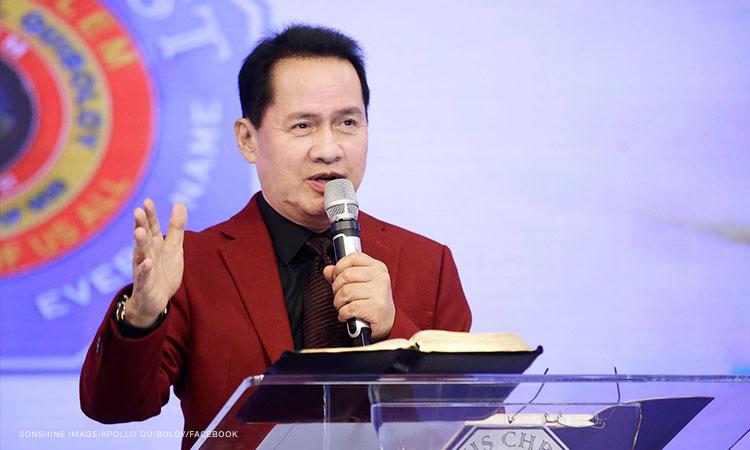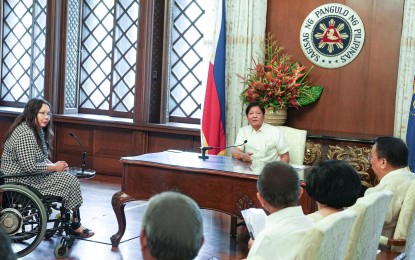CHINA ATTACKS IN WPS ANEW; PINOYS TRAMPLE ON XI EFFIGY; Biden, Japan, PHL leaders meet in White House, boost alliance
By ALFRED GABOT and CLAIRE MORALES TRUE
Editor in Chief and Managing Editor
WASHINGTON/TOKYO/MANILA – As United States President Joe Biden hosts the leaders of Japan and the Philippines in the White House over defense, security and economic concerns, Filipino protesters trampled on the effigy of China President Xi Jinping angered by new attacks by the China Coast Guard on Philippine vessels in the tension-filled West Philippine Sea, a part of the Philippines territory and exclusive economic zone.
This developed as war ships of the US, the Philippines, Japan and Australia held their joint maritime drills in the region and the biggest “Balikatan” war games of some 17,000 American and Filipino soldiers got under way with guest troops from Japan, Australia and other allies. Some China warships were spotted watching the drills but there was no incident.
In another military front, jet fighter units from the Philippines and the United States started the first iteration of the Cope Thunder-Philippines (CT PH 24-1) at the Basa Air Base in Floridablanca, Pampanga and up to the Northern Luzon intensive military training area near Taiwan, involving 700 airmen and several fighter planes of the Philippine Air Force (PAF) and the United States Air Force (USAF).
_________________
WASHINGTON, D.C. — US President Joe Biden, Japanese Prime Minister Fumio Kishida and Philippine President Ferdinand Marcos Jr. concluded their maiden trilateral summit at the White House forging a stronger alliance for peaceful, stable and progressive Indo Pacific eve as they expressed their serious concerns over China’s “dangerous and aggressive behavior” in the South China Sea (SCS). (See earlier Newsflash post.)
In a joint statement issued after their trilateral meeting at the White House in Washington DC, the three leaders said the militarization of reclaimed features and unlawful maritime claims in the SCS is a cause for concern.
“We steadfastly oppose the dangerous and coercive use of Coast Guard and maritime militia vessels in the South China Sea, as well as efforts to disrupt other countries’ offshore resource exploitation,” the three leaders said.
“We reiterate serious concern over the PRC’s (People’s Republic of China) repeated obstruction of Philippine vessels’ exercise of high seas freedom of navigation, and the disruption of supply lines to Second Thomas Shoal (Ayungin Shoal), which constitute dangerous and destabilizing conduct,” they added.
They called on China to adhere to the Hague-based Permanent Court of Arbitration’s “final and legally binding” ruling on July 12, 2016 which upheld the Philippines’ sovereign rights and jurisdiction in its exclusive economic zone.
The three leaders emphasized the need to deepen cooperation, in support of a “free and open” Indo-Pacific, amid “serious” concerns over the current situation in the East China Sea.
They reiterated their “strong opposition” to China’s attempt to unilaterally change the status quo by force or coercion.
They cited the importance of peace and stability across the Taiwan Strait as an “indispensable element of global security and prosperity,” stressing that there is no change in their positions on Taiwan and their call for a peaceful resolution of cross-Strait issues.
“We underscore our nations’ unwavering commitment to freedom of navigation and overflight, and the importance of respecting the sovereign rights of states within their exclusive economic zones consistent with international law, as reflected in the 1982 United Nations Convention on the Law of the Sea (UNCLOS),” they said.
The three countries plan to enhance defense cooperation by conducting combined naval training and exercises with additional partners around Japan in 2025.
The White House later released the joint statement of President Biden, Prime Minister Kishida and President Marcos Jr.:
We, the leaders of Japan, the Philippines, and the United States, met today for the first Summit between our three countries. As three Indo-Pacific maritime democracies, our nations and the half-billion people we collectively represent are bound together by historical ties of friendship, robust and growing economic relations, and a proud and resolute commitment to our shared fundamental values of freedom, democracy, respect for human rights, and the rule of law. We gather today in Washington as equal partners and trusted friends, united by the vision we share of a free and open Indo-Pacific and international order based on international law—a vision we pledge to advance together for decades to come. We believe, fundamentally, that by working together, we can advance the security and prosperity of our own nations, the Indo-Pacific region, and the world.
Our historic Summit today is the culmination of decades of partnership and builds on the recent momentum of our governments’ trilateral efforts. In June 2023, our national security advisors met in Tokyo, and again virtually in December 2023, to establish a common framework for trilateral cooperation among our nations. In July and September 2023, our foreign ministers met to advance our shared agenda on economic security, development, humanitarian assistance, maritime security, and defense. In September 2023, Prime Minister Kishida, President Marcos, and Vice President Harris met to deepen our trilateral cooperation. Following today’s Summit, we intend to further expand trilateral engagements across our governments and to intensify our cooperative efforts across sectors.
Our three nations share a firm commitment to a free and open Indo-Pacific that is connected, prosperous, secure, inclusive, and resilient. We welcome coordination and cooperation with a wide range of partners who share these goals. In that spirit, we affirm our unwavering support for ASEAN centrality and unity, and the ASEAN Outlook on the Indo-Pacific. We underscore our support for Pacific Island countries and intend to transparently and effectively work in partnership with the Pacific Islands Forum (PIF) to support the 2050 Strategy for the Blue Pacific Continent. Additionally, we welcome efforts to support a peaceful and stable, rules-based Indo-Pacific region, including from the Quad, AUKUS, and the U.S.-Japan-Republic of Korea trilateral framework.
Promoting Inclusive Economic Growth and Economic Resilience
Our three nations resolve to promote enduring, inclusive economic growth and resilience in our countries and the broader Indo-Pacific. We are pursuing economic projects that advance our shared objectives: promoting broad-based and sustainable economic growth, and investing in resilient, reliable, and diversified supply chains. We support the continued progress of the Indo-Pacific Economic Framework for Prosperity (IPEF) to advance resilience, sustainability, inclusiveness, economic growth, fairness, and competitiveness for our economies and the broader region. President Marcos welcomes President Biden’s recent Presidential Trade and Investment Mission to the Philippines and the announcement of more than $1 billion in U.S. private sector investments that help promote the Philippines’ innovation economy, clean energy transition, and supply chain resilience, as well as the continued U.S. commitment to mobilizing private sector investment in the Philippines. President Marcos appreciates Japan’s contribution of Official Development Assistance and private sector investment in its 2022-2023 fiscal year, which exceeded the pledge of JPY 600 billion made in the 2023 Japan-Philippines Joint Statement. We welcome the first trilateral commerce and industry ministers’ meeting that took place earlier today to advance our shared agenda. Our three nations commit to facilitating the steady implementation of ongoing and future economic cooperation projects toward the Philippines’ attainment of upper middle income country status and beyond.
We express concern over and strongly oppose economic coercion, stress the importance of a rules-based economic order, and underscore the need for close coordination in dealing with economic coercion.
Announcing the Luzon Corridor
Our three nations are proud to partner on the first Partnership for Global Infrastructure and Investment corridor in the Indo-Pacific. Today we are launching the Luzon Economic Corridor, which will support connectivity between Subic Bay, Clark, Manila, and Batangas in the Philippines. Through this corridor, part of the Partnership for Global Infrastructure and Investment-IPEF Accelerator, Japan, the Philippines, and the United States commit to accelerating coordinated investments in high-impact infrastructure projects, including rail; ports modernization; clean energy and semiconductor supply chains and deployments; agribusiness; and civilian port upgrades at Subic Bay. Japan has long been supporting connectivity in this area, including rails and roads, through Japan International Cooperation Agency. We plan to work with multilateral organizations and the private sector to attract quality, transformative investments. Together we intend to hold a trilateral event promoting investment in the Luzon Corridor on the margins of the Indo-Pacific Business Forum in Manila in May—the premier U.S. commercial event in the region. The U.S. International Development Finance Corporation also intends to open a regional office in the Philippines to facilitate further investments across the Philippines. The Luzon Corridor is a demonstration of our enhanced economic cooperation, focused on delivering tangible investments across multiple sectors. Japan, the Philippines, and the United States are also partnering to expand cooperation and investments in other areas of the Philippines.
Developing Critical and Emerging Technologies
We commit to harnessing the talents and ingenuity of our citizens to seize cutting-edge technological opportunities. The United States, subject to Congressional notification, and Japan, with support from Japanese industry, intend to provide at least $8 million for Open Radio Access Network (RAN) field trials and the Asia Open RAN Academy based in Manila, to enable future commercial deployment and an open, interoperable, secure, reliable, and trusted information communications technology ecosystem in the Philippines. This builds on prior U.S. and Japanese investment of over $9 million for these projects in the Philippines. The government of Japan is also seriously considering further investments for the potential commercial deployment of Open RAN technology in the Philippines, including from the Global South Future-Oriented Co-Creation Project. The United States and Japan welcome the Philippines’ plan to pilot Open RAN in its national broadband program and free Wi-Fi project. The United States and Japan commend the Philippines’ commitment to develop a national Open RAN policy framework, reaffirming the Philippines’ endorsement of open, interoperable, and trusted architectures. This year, our three countries look forward to holding the first trilateral Cyber and Digital Dialogue to explore additional cooperation opportunities.
We intend to pursue a new semiconductor workforce development initiative, through which students from the Philippines will receive world-class training at leading American and Japanese universities, to help secure our nations’ semiconductor supply chains. This initiative complements the expansion of semiconductor investments in the Philippines that would strengthen supply chain resiliency among our three nations. Furthermore, through the CHIPS and Science Act’s International Technology Security and Innovation Fund, the United States and the Philippines plan to coordinate our efforts to develop and expand the Philippine semiconductor workforce to strengthen the global supply chain.
Advancing Climate Partnership and Clean Energy Supply Chains
Recognizing the existential threat of the climate crisis, we affirm our commitment to take urgent action this decade to reduce greenhouse gas emissions in line with a 1.5 degrees Celsius warming limit and accelerate efforts to build clean energy economies, while noting different national circumstances.
Our three nations seek to expand trilateral cooperation in the Philippines on the deployment of clean energy technologies, including renewable energy projects such as solar and wind, to support energy requirements in the Philippines and help ensure a just energy transition. We also welcome the first Nuclear Energy Summit in Brussels on March 21, where participants from more than 35 countries, including Japan, the Philippines, and the United States, recognized nuclear energy as an important component of a multifaceted and inclusive clean energy transition. Recognizing the Philippines’ request for further training and capacity building for scientists, engineers, and relevant personnel and policy-makers, our three nations seek to expand our partnership on safe and secure civil-nuclear capacity building. Under the Foundational Infrastructure for Responsible Use of Small Modular Reactor Technology (FIRST) program, the United States and Japan plan to co-host a nuclear energy study tour in Japan for nuclear experts and policy decision-makers from the Philippines and other FIRST partner countries. We also plan to deepen trilateral cooperation on civilian nuclear workforce development through a trilateral dialogue this year, to advance the Philippines’ civil nuclear energy program.
Japan, the Philippines, and the United States are working together to expand cooperation for the transition to clean energy and create high-standard, clean energy supply chain jobs across our three nations through the mutually beneficial development of resources in clear, transparent, and fair market competition with strong protections for labor rights and the environment. Japan, the Philippines, and the United States support critical minerals industries in all of our countries as a way to promote resilient and reliable global supply chains for critical minerals. We share the goal of producing and supplying battery materials and batteries for electric vehicles and energy storage systems for the global marketplace. The United States, under the International Visitor Leadership Program, plans to manage a clean energy supply chain training program for select participants from Japan and the Philippines. In addition, the United States and Japan look forward to the Philippines being a founding member of the Minerals Security Partnership Forum, which signifies an important step towards securing and diversifying our collective clean energy supply chains.
Partnering for Peace and Security
Today, President Biden reaffirms the ironclad U.S. alliance commitments to both Japan and the Philippines, which have helped safeguard peace and security in the Indo-Pacific for decades. We underscore our nations’ unwavering commitment to freedom of navigation and overflight, and the importance of respecting the sovereign rights of states within their exclusive economic zones consistent with international law, as reflected in the 1982 United Nations Convention on the Law of the Sea (UNCLOS).
We express our serious concerns about the People’s Republic of China’s (PRC) dangerous and aggressive behavior in the South China Sea. We are also concerned by the militarization of reclaimed features and unlawful maritime claims in the South China Sea. We steadfastly oppose the dangerous and coercive use of Coast Guard and maritime militia vessels in the South China Sea, as well as efforts to disrupt other countries’ offshore resource exploitation. We reiterate serious concern over the PRC’s repeated obstruction of Philippine vessels’ exercise of high seas freedom of navigation and the disruption of supply lines to Second Thomas Shoal, which constitute dangerous and destabilizing conduct. The final and legally binding July 12, 2016 Arbitral Tribunal determined that this feature lies within the Philippines’ exclusive economic zone, and we call on the PRC to abide by the ruling.
We express our serious concerns regarding the situation in the East China Sea, and reiterate our strong opposition to any attempts by the PRC to unilaterally change the status quo by force or coercion in the East China Sea, including through actions that seek to undermine Japan’s longstanding and peaceful administration of the Senkaku Islands.
We affirm the importance of peace and stability across the Taiwan Strait as an indispensable element of global security and prosperity, recognize that there is no change in our basic positions on Taiwan, and call for a peaceful resolution of cross-Strait issues.
We welcome recent cooperation among our three nations in support of a free and open Indo-Pacific and commit to deepening that cooperation. The U.S. and Japan continue to support Philippine Coast Guard capacity building, including through Japan’s recent provision of twelve Coast Guard vessels and plans to provide five additional vessels to the Philippines. Following the first-ever joint exercise between our coast guards in 2023, the United States looks forward to welcoming Philippine and Japan Coast Guard members onto a U.S. Coast Guard vessel during a patrol in the Indo-Pacific this year. Within the next year, our coast guards also plan to conduct an at-sea trilateral exercise and other maritime activities in the Indo-Pacific to improve interoperability and advance maritime security and safety. We announce the establishment of a trilateral maritime dialogue to enhance coordination and collective responses to promote maritime cooperation. We are concerned about illegal, unreported, and unregulated fishing. We support the ability of Filipino and Japanese fisherfolk to pursue their traditional livelihoods. To build regional capacity and address threats posed by transnational crime, illegal, unreported, and unregulated fishing, and other maritime challenges, Japan, the Philippines, and the United States plan to expand our efforts to provide maritime law enforcement training and support to partner countries in the region.
Our three nations pledge to strengthen our extensive coordination to promote maritime domain awareness and deepen cooperation on humanitarian assistance and disaster relief. We emphasize our commitment to advancing multilateral maritime domain awareness cooperation through such venues as the Indo-Pacific Partnership for Maritime Domain Awareness (IPMDA). We intend to identify and implement opportunities for combined training with Southeast Asian regional partners. We are also launching a Japan-Philippines-U.S. humanitarian assistance and disaster response exercise, which could be integrated into trilateral or multilateral activities, including Balikatan 2025, to ensure our countries are ready and able to work together seamlessly and expeditiously in response to any crisis or contingency. We resolve to advance trilateral defense cooperation, including through combined naval training and exercises between our three countries and additional partners, such as the recently concluded Maritime Cooperative Activity between Japan, the Philippines, the United States, and Australia, and by coordinating U.S. and Japanese support for Philippine defense modernization priorities. We plan to conduct a maritime training activity around Japan in 2025. Japan also continues to contribute through its new “Official Security Assistance” cooperation framework. The U.S. and the Philippines welcome Japan’s revision of the Three Principles on the Transfer of Defense Equipment and Technology and its Implementation Guidelines, which bolsters cooperation through joint development and production to enhance our deterrence capabilities in the region. The U.S. and Japan also welcome the growing defense cooperation between Australia and the Philippines and between the Philippines and the Republic of Korea.
Our three nations affirm our commitment to the complete denuclearization of the Korean Peninsula and strongly condemn the Democratic People’s Republic of Korea’s (DPRK) escalatory threats and unprecedented number of ballistic missile launches, including multiple intercontinental ballistic missile launches, which pose a grave threat to peace and security. We emphasize the importance of addressing the human rights and humanitarian concerns of the international community, including the immediate resolution of the abductions issue. We strongly urge the DPRK to comply with the relevant UN Security Council resolutions, and refrain from continued development, testing, and transfer of ballistic missiles to any country, including Russia, which has used these missiles against Ukraine. We assert that these DPRK actions have severe security implications for the Indo-Pacific and European regions. As we continue to affirm our commitment to international law, including the United Nations Charter, we reiterate our unwavering support for Ukraine’s sovereignty, independence, and territorial integrity within its internationally recognized borders. To that end, we recall the United Nations General Assembly resolutions stating that no territorial acquisition resulting from the threat or use of force shall be recognized as legal. Russia’s threats of nuclear weapon use in the context of Russia’s invasion of Ukraine are unacceptable, and we state unequivocally that any use of a nuclear weapon by Russia in Ukraine would be completely unjustifiable.
We reaffirm our joint pursuit of a world without nuclear weapons, with the Nuclear Non-Proliferation Treaty as its cornerstone, and call on nuclear weapon states to promote stability and transparency, and engage in substantive dialogue on reducing nuclear risks. As founding members of the “FMCT Friends,” we also call for the immediate commencement of long-overdue negotiations on a treaty banning the production of fissile material for nuclear weapons.
We are committed to championing gender equality and the rights of women and girls in all their diversity. In this regard, we commit to strengthening the Women, Peace and Security (WPS) Agenda. We highlight the leading role of women in preventing violent conflict, delivering relief and recovery efforts and pledge to advance the full, equal and meaningful participation of women in peace and political processes. We welcome the Philippines hosting an International Conference on Women, Peace, and Security in October this year, to review global implementation of the United Nations Security Council Resolution 1325 ahead of its 25th Anniversary in 2025.
Finally, we underscore the importance of strong democratic institutions, the rule of law, and respect for human rights, gender equality, and human dignity. We represent proud, resilient democracies, mindful of our respective challenges but determined to overcome them, and we remain committed to safeguarding the human rights, media freedom, and labor rights of our people. These democratic values form the very foundation of our bilateral relationships and this trilateral partnership. These ideals have helped us build and sustain the mutual trust between us as leaders and between our people. United by these shared values, we commit to continuing our work together to address the consequential issues of our time, and to build a better future for future generations across our nations, the Indo-Pacific, and the world.
A new trilateral chapter between our three nations begins today.
_________________
PAF Air Force spokesperson Col. Ma. Consuelo Castillo said PAF FA-50PH fighter jets and the USAF F-16s and C-130J aircraft are participating in the air drills over the West Philippine Sea and air space of the Philippines to demonstrate freedom of air navigation, among others.
Before flying to Washington D.C., President Ferdinand Marcos Jr. and Japanese Prime Minister Fumio Kishida spoke of “grave concern” over the increasing “dangerous and illegal maneuvers” of China warships, China Coast Guard plus Chinese militia disguised as fishers in the fully charged region as they aired hopes for easing the tension through their first ever trilateral summit with President Biden.
“The current security environment is tough and complex, and we are at a turning point in history,” Kishida said. “Cooperation between Japan and the United States and like-minded countries is a very important issue,” he added.
“Close cooperation between Japan, the U.S., and the Philippines is crucial for a free and open order based on the rule of law and for economic prosperity in the region,” Kishida said.
Ahead of the trilateral summit, President Biden and Kishida first met and agreed to deepen their defense and security cooperation together with other allies, among others, to enable greater coordination and integration of forces to ensure they are optimally postured and linked to one another.
President Biden hosts the first-ever leaders’ White House summit between the US, Japan and the Philippines to draw Pacific allies and partners closer as the Indo Pacific region grapples with China’s aggression and nuclear provocations from North Korea.
The three leaders are to hold private discussions on the South China Sea, where the Philippines is facing “extraordinary pressure,” national security adviser Jake Sullivan said on the eve of the summit, as the Philippines addresses with counter measures against Beijing’s aggression in the Philippine territory and exclusive economic zone.
Leading the commemoration of the Day of Valor (Araw ng Kagitingan) at the Mount Samat National Shrine in Pilar, Bataan, President Marcos Jr. called on Filipinos “not to allow the country to suffer from oppression and subjugation in its territory” in the presence of war veterans, the Japanese ambassador and the US Embassy Charge d’Affaires, the Armed Forces of the Philippines chief Gen. Romeo Brawner Jr., American soldiers, among others.
Marcos said the country still faces a myriad of challenges over eight decades since the Second World War, including threats to its sovereign rights that have already “caused physical harm to our people.” Marcos did not mention China’s aggression in his televised speech, but listeners were certain he was addressing the Chinese escalating threat.
“Ang mga ito ay hindi katanggap-tanggap. Hindi makatwiran at hindi matarungan lalo na sa panahong ito ng payapang pakikipag-ugnayan ng mga bansa (These are unacceptable. They are unreasonable and unjust especially in this era of peaceful relations among countries),” Marcos said.
Marcos called on the Filipinos to never allow oppressors in the country’s “own backyard” much like how the forebears bravely fought for freedom and independence.
“Nawa’y magsilbing inspirasyon ang mga kaganapan noong 1942 at ang tagumpay natin noong 1945 sa ating lahat. Tulad ng ipinamalas ng ating mga dakilang ninuno, hindi tayo dapat magpasupil at magpa-api, lalo na sa loob ng ating sariling bakuran (May the events of 1942 and our eventual victory in 1945 serve as an inspiration to all of us. As our great forebears demonstrated, we should not be subjugated and oppressed, especially within our own backyard),” he said.
“Nawa’y mapagkunan natin ito ng ibayong kamalayan, tapang at lakas ng loob. Higit sa lahat, nawa’y patuloy nitong pagtibayin ang ating pagkakaisa at ang ating pagiging makabansa (May this provide us with greater awareness, courage and bravery. Above all, may it continue to strengthen our unity and our nationalism).”
The President issued the statement in the face of the heightened tension in the West Philippine Sea (WPS) following China’s aggressive actions in the waterways.
Interviewed in Bacolod City, Marcos expressed hope that the first multilateral maritime activity held by the Philippines, the United States, Japan, and Australia would put an end to China’s aggression in the West Philippine Sea (WPS) as he added the Philippines continues efforts to ease the tension in the disputed area, including sustained communications with China.
“I sincerely hope so. I really do. I really do, but again, we are trying everything,” the President said when asked if he expected the multilateral maritime cooperative activity (MCA) held Sunday would prevent a repeat of incidents of Chinese aggression in the area.
In another statement after the Day of Valor rites, Marcos disclosed that there will be an agreement on South China Sea issues at the White House summit, but stressed the summit is mainly aimed at boosting economic ties between the three allies.
“The main intent of this trilateral agreement is for us to be able to continue to flourish, to be able to help one another, and of course to keep the peace in the South China Sea and the freedom of navigation,” Marcos said before departing for Washington.
In his departure speech , Marcos said the White House summit builds upon his previous meetings with Prime Minister Kishida and US Vice President Kamala Harris last September in Jakarta, Indonesia, as well as the trilateral meetings held by the foreign ministers and the national security advisers of the three countries last year.
During the summit, the President said he will underscore the importance of enhancing continued economic cooperation among the countries with the view of promoting resilience and security.
“I intend to explore ways of advancing cooperation especially in the areas of critical infrastructure, semiconductors, digitalization, and cybersecurity, critical minerals, renewable energy, as well as defense and maritime cooperation,” he said.
Marcos said he will also exchange views with his counterparts on various “regional security issues of mutual concern while continuing to reiterate the importance of upholding the rule of law and observing rules-based international order in the Indo-Pacific region.”
On the sidelines of the three-country summit, the President is also expected to have a bilateral meeting with Biden, where they will continue the discussions on strengthening further the alliance between the Philippines and the US.
Marcos will also meet with business leaders in the US to invite them to invest in the Philippines.
Vice President Sara Duterte, Executive Secretary Lucas Bersamin, and Agrarian Reform Secretary Conrado Estrella have been designated as government caretakers during the President’s US visit.
President Marcos, meanwhile, said he was “horrified” by the idea that then President Rodrigo Duterte nd President Xi had allegedly entered into a gentleman’s agreement or secret agreement which he said had compromised “the territory, the sovereignty and sovereign rights of the Philippines.”
On March 23, a China Coast Guard vessel water cannoned a Philippine supply ship en route to Ayungin shoal, a maritime feature within the WPS. The attack left the supply vessel heavily damaged and its crew members injured.
At press time, meanwhile, residents of Pag-Asa island, part of Kalayaan town of Palawan in West Philippine Sea expressed alarm after China Coast Guard and militia ships sailed close to the eastern shore of the island.
The Philippine Coast Guard confirmed the Chinese ships sailed 3.2 nautical miles away from Pag-asa Island.
Marcos has ordered the Department of National Defense (DND) and Armed Forces of the Philippines (AFP) to assess and submit a report on the military’s equipment.
“These measures aim to show our unwavering support to our soldiers as they face new and growing challenges,” he said.
The AFP previously said it is now focusing on addressing external threats after decades of centering its operations to addressing insurgency and terrorism in the country.
“Ours is a complicated world today, but we must not yield. We must not back down from any and all challenges that seek to threaten our peace, our honor, and our very existence,” Marcos stressed.
Defense Secretary Gilberto Teodoro Jr., meanwhile, said the successful multilateral maritime cooperative activity (MMCA) of naval forces of the Philippines, United States, Japan and Australia is part of Manila’s ongoing defensive posture shift to protect its territories, particularly its exclusive economic zone (EEZ).
“The Philippines is changing its defense paradigms, strengthening its own capabilities, and leveraging alliances with allies and like-minded nations,” Teodoro said in a statement.
Teodoro was referring to the “Comprehensive Archipelagic Defense Concept” (CADC), aimed at developing the country’s capability to protect its entire territory to ensure that the next generation of Filipinos would be able to enjoy its natural resources.
“The Philippines is committed to preserving a secure, stable, and peaceful Indo-Pacific Region. As an archipelagic country, it both upholds and champions a rules-based global order, especially in the maritime domain, where the primacy of UNCLOS (United Nations Convention on the Law of the Sea) is well-established and enshrined in the 2016 Arbitral award,” he added.
During the April 7 MMCA in the West Philippine Sea, the Philippine Navy deployed the offshore patrol vessel BRP Gregorio Del Pilar (PS-15) with its AW-109 helicopter, missile frigate BRP Antonio Luna (FF-151) with its attached AW-159 Wildcat anti-submarine helicopter, and patrol ship BRP Valentin Diaz (PS-177).
Meanwhile, the US Navy participated with a littoral combat ship, USS Mobile, and a P-8A Poseidon aircraft along with the Royal Australian Navy’s guided missile frigate HMAS Warramunga and a Royal Australian Air Force P-8A Poseidon maritime patrol aircraft; and Japan Maritime Self-Defense Force’s destroyer JS Akebono.













